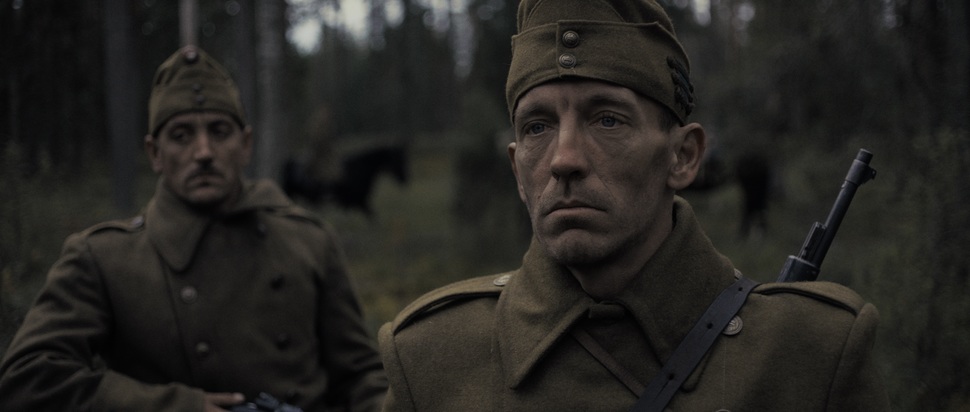Dénes Nagy on WWII drama Natural Light
Hungarian director Dénes Nagy discusses his bracing new World War Two film Natural Light, which follows a Hungarian soldier tasked with keeping order in occupied Ukraine at the behest of the Axis Powers
“My grandfather once told me about the time he was ordered to shoot a partisan,” Hungarian director Dénes Nagy confides to us as we sit down to discuss his Second World War film Natural Light. “Luckily fate intervened and he didn't have to kill this man, but I was curious to know how he felt in that moment. However, when I asked him he couldn’t give me a clear answer, he just told me he didn’t remember.”
Heavy and malodorous with memories that refuse to be chased away, Natural Light is far from a conventional war film. It takes place in occupied Ukraine, where the Hungarian army – aligned with the Axis Powers – were tasked with maintaining order. “My grandfather’s stories about the war always sounded like they were from an action movie; he rarely talked about what he really experienced,” Nagy tells us as he discusses the legacy of the Second World War in his homeland. “We Hungarians know very little about the war because we became part of the Eastern Bloc as soon as it ended. It was taboo to talk about what we did to the Soviet soldiers.”
The war persists in the popular imagination as a period of history when everyone fought against the same foreign threat, but in Hungary it’s more complicated. Instead of focusing on heroic tales of valour, Natural Light revolves around questions of individual responsibility and a desire to prompt collective remembering. “It was only possible to talk about the war after the fall of the Communist government in 1989. All of a sudden new history books were published, but it was too late. Many of the people who had served in the army had died and their secrets were buried with them.”
A loose adaptation of Pál Závada’s novel of the same name, Natural Light immerses us in the experiences of István Semetka, a farmer who serves in the Hungarian army as a corporal scouting the Ukrainian countryside for partisan groups. “I always knew I wanted to make a film about these occupied territories,” Nagy tells us when asked what drew him to Závada’s novel. “It’s a huge book, covering 20 years of Hungarian history, but the film focuses on this tiny passage about a man who goes to war and finds himself implicated in the atrocities committed by the Hungarian army.”
Semetka is a morally mottled protagonist; not particularly heroic or wholly evil, he’s a simple man who struggles to square his desire to do the right thing with the primal urge to survive. Played by Ferenc Szabó, his deep-set eyes and blank expression depict the exterior of a man who has already grown used to the flavour of his own suffering. It’s a mesmerising performance made all the more remarkable given the film was cast entirely with non-professional actors from rural Hungary.
“It took two years to find the right people,” says Nagy. “It was important for me to find actors who had lived the same lives as these soldiers. I wanted people who had worked the land and experienced their own hardships. I feel that my role as a director is not to tell actors what to do. My responsibility is to find the right actors and allow them to give themselves to the film.”
While travelling to a remote village, Semetka’s company falls under enemy fire and his commander is killed. As the highest-ranking officer, he is forced to take over and finds himself faced with some difficult decisions. “Semetka’s experiences are based on the stories I read in the war diaries I discovered in the Budapest military archive,” Nagy says, adding: “These stories opened up a whole new world to me. They weren’t written by intellectuals, they were scrawled in pencil by labourers and farmers. Their stories are very matter of fact. I was fascinated by how the brutality and routine of war go hand-in-hand. They would describe arriving at a village, having dinner there, going to the church to pray, and then returning later that night to burn it to the ground. The only visual boundaries between these soldiers and the villagers they encounter is their uniforms; they were basically the same people.”
As soon as Semetka takes charge of his unit an air of detachment surrounds his actions and the film’s dark finale builds barometrically in the background. Is Nagy suggesting that our reluctance to interrogate the past leaves us blind to tragedies of the present? “For me, the film isn’t that complicated,” he tells us. “I want to make the audience feel like they’re lost. We all pretend that we know how to separate right from wrong, but when you find yourself in a position like Semetka, you quickly realise you are alone with your judgements. None of us knows how the decisions we make will be remembered, the tragedy is that we still have to take responsibility for them.”
Natural Light is available on streaming and in select cinemas from 12 Nov via Curzon
